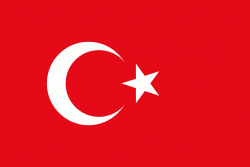Seyitgazi (Seyitgazi İlçesi)
Seyitgazi is a town and district of Eskişehir Province in the Central Anatolia region of Turkey. The central town of Seyitgazi lies at a distance of 43 km towards the south from the province capital of Eskişehir. According to 2010 census, population of the district is 16,222 of which 2,890 live in the town of Seyitgazi. The district covers an area of 1502 km2, and the average elevation is 1040 m.
Apart from the central town of Seyitgazi, the district has two dependent townships with own municipalities. These are Kırka and Doğançayır. The district also has 46 villages.
The town occupies the site of the Byzantine city of Nakoleia, and was named after the 8th-century Muslim saint (seyyid) and warrior Battal Gazi, who fell in a battle nearby in 740. A complex (külliye) dedicated to Battal Gazi and containing his tomb, a mosque, a medrese, cells and ceremonial rooms for dervishes as well as charitable services for the community such as kitchens and a bakery was built in 1208 on a hill overlooking the town by Ümmühan Hatun, wife of the Seljuk sultan Gıyaseddin Keyhüsrev I and further extended in 1511 by the Ottoman sultan Bayezid II. The shrine and the adjoining complex remain popular with local as well as foreign visitors.
Apart from the central town of Seyitgazi, the district has two dependent townships with own municipalities. These are Kırka and Doğançayır. The district also has 46 villages.
The town occupies the site of the Byzantine city of Nakoleia, and was named after the 8th-century Muslim saint (seyyid) and warrior Battal Gazi, who fell in a battle nearby in 740. A complex (külliye) dedicated to Battal Gazi and containing his tomb, a mosque, a medrese, cells and ceremonial rooms for dervishes as well as charitable services for the community such as kitchens and a bakery was built in 1208 on a hill overlooking the town by Ümmühan Hatun, wife of the Seljuk sultan Gıyaseddin Keyhüsrev I and further extended in 1511 by the Ottoman sultan Bayezid II. The shrine and the adjoining complex remain popular with local as well as foreign visitors.
Map - Seyitgazi (Seyitgazi İlçesi)
Map
Country - Turkey
 |
|
| Flag of Turkey | |
One of the world's earliest permanently settled regions, present-day Turkey was home to important Neolithic sites like Göbekli Tepe, and was inhabited by ancient civilisations including the Hattians, Hittites, Anatolian peoples, Mycenaean Greeks, Persians and others. Following the conquests of Alexander the Great which started the Hellenistic period, most of the ancient regions in modern Turkey were culturally Hellenised, which continued during the Byzantine era. The Seljuk Turks began migrating in the 11th century, and the Sultanate of Rum ruled Anatolia until the Mongol invasion in 1243, when it disintegrated into small Turkish principalities. Beginning in the late 13th century, the Ottomans united the principalities and conquered the Balkans, and the Turkification of Anatolia increased during the Ottoman period. After Mehmed II conquered Constantinople (Istanbul) in 1453, Ottoman expansion continued under Selim I. During the reign of Suleiman the Magnificent, the Ottoman Empire became a global power. From the late 18th century onwards, the empire's power declined with a gradual loss of territories. Mahmud II started a period of modernisation in the early 19th century. The Young Turk Revolution of 1908 restricted the authority of the Sultan and restored the Ottoman Parliament after a 30-year suspension, ushering the empire into a multi-party period. The 1913 coup d'état put the country under the control of the Three Pashas, who facilitated the Empire's entry into World War I as part of the Central Powers in 1914. During the war, the Ottoman government committed genocides against its Armenian, Greek and Assyrian subjects. After its defeat in the war, the Ottoman Empire was partitioned.
Currency / Language
| ISO | Currency | Symbol | Significant figures |
|---|---|---|---|
| TRY | Turkish lira | ₺ | 2 |
| ISO | Language |
|---|---|
| AV | Avar language |
| AZ | Azerbaijani language |
| KU | Kurdish language |
| TR | Turkish language |















